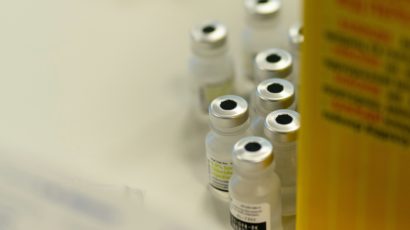Posted by Dr Michelle Wright
Covid booster – to boost or not?
COVID – with the seasons changing, there is new advice from the Federal Office of Public Health about who should be vaccinated this winter. Whether from natural infection, or through vaccination, nearly everyone in Switzerland has been exposed to coronavirus by now and so has some degree of immunity.
The good news is that the variants that are circulating at the moment seem to cause milder symptoms in those without any risk factors. But, as we start to socialise more indoors again in more enclosed spaces, then the chances of contracting COVID may increase again. And I’m sure many listeners will contest to the fact that you can get COVID more than once!
What’s the advice in Switzerland?
So, the advice is that anyone over the age of 16 at especially high risk gets a COVID-19 vaccination this autumn/winter. These people have a greater chance of developing severe infection, but their immunity to COVID tends to drop off more quickly as well.
Who is the vaccination advised for?
- All people over the age of 65
- Anyone over the age of 16 who has certain forms of chronic health conditions including:
- High blood pressure
- Cardiovascular disease
- Diabetes
- Respiratory diseases
- Cancer or other diseases that weaken the immune system
- Anyone with a Body Mass Index of 35 or more
- Those with chronic kidney problems
- Or those with liver cirrhosis
- It’s also advised that anyone over the age of 16 with trisomy 21 (or Down’s Syndrome) should be vaccinated as well.
What should I do if I am pregnant?
Its recommended that pregnant women discuss their personal situation with their treating doctor and make an informed decision about vaccination. With the current circulating variants, the risk of pregnancy complications because of COVID-19 infection is lower than with previous variants.
If you are at high risk or pregnant, the vaccination is free, and covered by the compulsory health insurance.
For anyone else under the age of 65, including healthcare workers, there is no recommendation to be vaccinated. This is because mild COVID infection would be expected, and the vaccine would only provide moderate short-term protection. Of course, people may choose themselves to be vaccinated but the vaccination wouldn’t be covered by the compulsory health insurance.
If vaccination is recommended for you, the ideal time to get it is from mid-October to mid-December. And it should be at least 6 months from your last vaccination, or last COVID infection. The vaccine can be given before, at the same time, or after flu vaccination – it doesn’t matter. And a messenger RNA vaccine modified to take into account the new variants, or a similarly modified Novavax vaccine are recommended.
Where can I find out more?
You can find more information on the Federal Office of Public Health Protect Yourself and Others webpage.
And of course, avoiding contact with others if you have cold symptoms, coughing and sneezing into a tissue or the crook of your arm, cleaning your hands regularly, and ventilating spaces several times a day are going to help protect against all respiratory illnesses this winter, not just COVID.
Interested in learning how you could arm yourself with first aid knowledge? Want the skills to act in a medical emergency? Why not have a look at our current courses offered?





